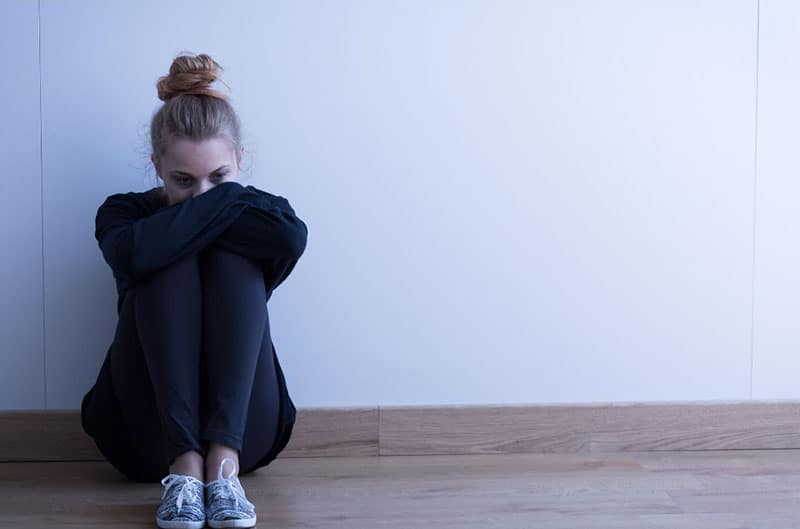What Is The Point Of Life? Tips For Finding Your Purpose
What is the point of life?
Or a slightly more unsettling version: What’s the point of life if we’re going to die?
Have you ever had that moment in life when you woke up and asked yourself this question?
It usually happens when life gets tough. Some people are naturally inclined to think about the meaning of life, while others think of it only when faced with life-changing moments.
Either way, I’m almost certain that everyone has thought about it at some point.
It’s a difficult question with no easy answer but that’s why it’s even more important to search for it – so that’s what I did. After some thorough thinking this is the best I could come up with:
The point of life is to fill it with purpose. When we have a purpose we have a reason to live which then makes simply living the whole point.
I hope this is making sense to you but if it doesn’t, let me explain.
Human beings come to this world as small helpless creatures emerging from the safest place imaginable – a mother’s womb.

Imagine that soft, warm, self-sustaining space we inhabited for a whole nine months being taken away from us.
All of a sudden we’re pulled out of it into the cold and sterile hospital building with weird noises and blinding lights.
When you think about it that way it definitely explains why babies cry when they’re being born, doesn’t it?
But did you ever think about how weird and almost fallible it is that you don’t remember that moment at all?
The fact that you don’t remember the part of your life you already experienced?
Personally, I find it weird that we start remembering our life from one point in time and the rest of it is just a foggy mess.
It’s even weirder that almost all of our memories are an altered reality, but that’s another story.
This introduction was made to say this: Babies are conscious creatures without knowledge of self.
They are drenched in reality with no rules. Tabula rasa. Only later on in life are rules imposed on them.

Related: 60 Who Am I Questions And Riddles That Will Boost Your Brainpower
That makes me wonder about what we are without the rules of the external world as we start as an internal world.
What happens to human consciousness when the external and internal clash? Is that what we call life?
If it is, what is the meaning of life?
I’m no philosopher nor theologist but I am a curious human being and I feel like that gives me the right to speak on this matter.
I’ve dabbled a little in religion, different philosophies like existentialism, even nihilism, and anything else that grabbed my attention but none of them gave me an answer I was looking for.
All of that led me to my next conclusion: There’s no universal answer because experiences are individual.
The purpose of life is individual. Finding meaning is closely attached to what we think meaningful life is. For one person it’s their loved ones, for another it’s attaining wealth.
It’s not surprising we so often don’t understand each other when life’s meaning depends on the circumstances of our lives that we’re living in the physical world but that we’re processing internally as no one can really see what’s inside another person’s mind.
Related: Passion Vs. Purpose: Here’s Why You Need Both

In words of Anaïs Nin: “There is not one big cosmic meaning for all; there is only the meaning we each give to our life, an individual meaning, an individual plot, like an individual novel, a book for each person.”
There are 7.8 billion people on earth right now, that means 7.8 billion different experiences.
The fact that we’re now more than ever exposed to seeing the lives of others doesn’t help with the confusion.
We’re constantly bombarded with other people’s thoughts, habits, point of view, and what not and it’s not unusual to be confused about your own purpose or even mistake it for someone else’s.
In fact, seeing someone else doing supposedly well in life often makes us feel like we’re falling behind and that’s just what makes things worse.
Do I even need to mention how that’s usually done through painfully staged content on social media?
Life in the 21st century is hectic. It’s much more hectic than it was in centuries gone by and I’m afraid to think what will happen to future generations.
There’s an obsession for meaning and alarming meaninglessness at the same time, and that’s what leads me to the next question:
Does thinking about the purpose alienate us from the purpose?

“You will never be happy if you continue to search for what happiness consists of. You will never live if you are looking for the meaning of life.” – Albert Camus
In my humble opinion, it usually does.
If anything, we know we’re, generally speaking – limited.
We’re not physically equipped to survive on our own like most animals and we’re not smart enough or either spiritually or technologically advanced enough to grasp that something we’re always striving for, that something beyond the reason and senses.
The only things we have are reason and faith. Even non-religious people need to have faith in order to get up in the morning and go about their day.
It doesn’t have to be faith in the supernatural because it’s enough just to make plans for the future. That in itself is a sign of faith.
Knowing this, actively searching for the purpose by just thinking about it seems futile. It usually doesn’t lead to a better life but instead causes frustration.
It heightens pressure and makes you go into panic mode thinking you HAVE to do this and that in order to live a life worth living by someone else’s standards.
At the risk of sounding overly metaphysical, I have to say that listening to your inner being without obsessively thinking about life’s meaning is much more productive.
It’s just about living life, experiencing trial and error, and pushing yourselves outside of your comfort zone.
There’s no magical thought that will change your life because life is lived by taking action and living in the present moment.
Relax, nobody knows what the heck they’re doing either

“Accepting the absurdity of everything around us is one step, a necessary experience: It should not become a dead end. It arouses a revolt that can become fruitful.” – Albert Camus
When you feel like you’re lost in life just think of this:
We’re four-limbed creatures that live on a giant ball filled with water that’s spinning in the middle of something we call space, where there’s not enough air to breathe or to scatter light, and sound can’t be transmitted yet it’s not empty.
It’s pretty bizarre.
What’s even more bizarre is the fact that we care about so many things while virtually knowing nothing about our own existence.
Yes, we have come a long way, science gives us explanations of how things work but we still don’t know why we exist in the first place.
There’s no manual for life. Everybody is – at the core – on their own.
Nobody knows what they’re doing.
I remember when it dawned on me that adults aren’t as knowledgeable about life as I thought they were.
In fact, it seems to me they’re faking adultness and just sort of winging it through life while pretending they have everything under control.
All of this can be terrifying or comforting, that’s up to you.
I think that human life is exceptional regardless of meaning.
The world made us believe that there’s no point in life if we’re not doing something BIG, something that will change the world and people’s lives.
That something is, for example, getting rich or famous or attaining spiritual enlightenment.
The reality is that people rarely do something big according to societal standards.
Don’t get carried away with the ideas that you have to achieve something like that to fulfill your life purpose, because you don’t.
If stuff like that really was the meaning of life, 90% of people would be severely depressed. It’s okay to strive to achieve your goals but you shouldn’t mistake them for the meaning of life.
Brace yourself: Life’s full of ups and downs

“If there is meaning in life at all, then there must be meaning in suffering.” – Viktor Frankl
Life is a journey without a map. We’re blind to what’s in front of us.
In order to go through it successfully, we need to accept the bad things along the way.
Polarities are part of life. Since the beginning of time, people have talked about good and evil, trying to depict all the shades of life and extract the meaning from the things around them.
When something bad happens we’re naturally inclined to start reexamining our life’s meaning.
For example, deaths of our loved ones, sickness, breakups, and other things that represent a loss of something valuable that gave meaning to our life.
These things trigger our sense of self and our purpose in life. We’re faced with the loss of meaning and it’s hard to find it while we’re spiraling down the whirl of despair and loss.
The struggle makes us search for answers and we often look for solutions in higher purpose. However, sometimes that higher purpose is nothing but to keep living day by day.
Things will change, they will improve, you’ll look back at them and know it all had to happen.
Don’t compare your life journey to others

“Uniqueness lies in not comparing oneself to others.” – Raheel Farooq
As I said earlier, it’s easy to fall into the trap of comparing your life to the lives of other people when we’re constantly looking at their lives.
It looks like some people have it easy, while others have it rough.
The key is to understand that if something looks a certain way, it doesn’t mean it really is. Everyone is fighting their own battle.
The funniest people in the world are depressed, the poorest people in the world are happiest.
Don’t compare yourself to others because your inner world isn’t the same as everyone else’s. Your personal journey is different to everyone else.
Comparing is like saying I’m never enough to ourselves. That’s simply not true. You’re enough as you are. You just need to accept that you’re not perfect and know that no one else is perfect either.
It’s great to take inspiration from other people and look for guidance in things they do and say, but the same things that work for them don’t have to work for you.
Don’t listen to others when it comes to decisions in your own life. They don’t know what you know about yourself.
People underestimate and overestimate each other all the time. They don’t have your experience, they don’t know what you’re capable of or what your purpose is.
Purpose is deeply intimate and personal.
If someone disagrees with the way you live your life – know that it has nothing to do with you as long you’re not endangering the lives of others.
Whatever they say is their opinion and nothing else. An opinion is not a fact. It’s just perspective and not the truth.
Letting go of the need for approval is hard for many people because that’s how we learn to earn love even though they say love should be unconditional.
There’s no objective rating scale that allows another person to judge you. Nobody knows what you’ve been through.
Nevertheless, we still measure our self-worth based on the approval of others and that makes us deeply unhappy.
We can’t be happy if there’s always something unattainable we long for. We can’t be happy if we’re living for other people. Living life free of the need for approval is key to well-being.
We don’t have to fulfill anyone’s expectations but our own. The moment we stop thinking about what others will think and start listening to what we want – things start to change.
Don’t let the careless word of others influence your whole mood. Don’t let it stress you.
Remember that you don’t have to explain yourself to others either. If they get you, that’s great, if they don’t, and you don’t feel comfortable explaining – just don’t do it.
Listen to your intuition

“Practice listening to your intuition, your inner voice; ask questions; be curious; see what you see; hear what you hear, and then act upon what you know to be true. These intuitive powers were given to your soul at birth.” – Clarissa Pinkola Estés
Another reason why you shouldn’t listen to others is because you already have your inner guide. You have intuition.
Tap into it.
To answer the question “what is the point of life?” one must be connected to one’s inner being, which is revealed through intuition.
Intuition is what will eventually lead us to our life purpose and spiritual awakening.
That’s why it’s so important. It’s what makes us authentic.
Authenticity means being exactly what we are. It means cultivating acceptance, integrity, courage, and practicing introspection; doing things with intention.
For a long period of time intuition was considered exclusively pseudo-science.
Luckily, recent studies show that intuition is a real psychological process; the brain uses past experiences and signals from the self and the things that surround you to make a decision.
The decision happens so fast that it doesn’t register on a conscious level. Our brains know the answer way before analytically processing information.
But how do we connect to our intuition?
1. Stop and listen
It’s as simple as it sounds.
You can’t hear your intuition if you’re not listening. When you find yourself in a situation where you feel doubtful and need guidance – ask yourself: What do I really want? Track down that first hunch that occurred when something happened.
2. Trust your gut
You know that feeling. You know when something is bad or good and you can feel it in your gut. It manifests on or in your body and it’s usually gut.
This too isn’t completely scientifically false considering the gut is lined with a network of nerve cells and is called the second brain.
That’s the same reason we get sick in our stomach when we get nervous.
3. Recognize your feelings
The more you train to hear your intuition the more you will feel it in other ways too. Everybody has their own way of knowing for a lack of a better word.
Sometimes it’s a physical manifestation such as goosebumps, a racing heart, a feeling in your belly and just that knowing that we can’t explain; you just feel if something is right or not.
Trusting your intuition might be hard at first but it’s a skill you can train and perfect and it’s definitely worth trying.
4. Learn to let go of negative emotions
Negative emotions are necessary. However, we shouldn’t let them take over because they cloud our intuition. It’s more likely we’re going to do something intuitively right when we’re in a good mood.
Negative emotions can help us understand ourselves on a deeper level but that doesn’t mean we should dwell on them.
When we’re at peace with ourselves is when we’re more connected to our purpose so it’s easier to hear out intuition.
5. Choose your friends carefully
We already discussed how others affect our lives. It’s true that we have to mind our own business and listen to ourselves but other people are still a big part of our life.
Surround yourself with the people who won’t drain you or put you down.
You probably already met people who did nothing but that. It’s usually in a passive-aggressive way that gives you no visible reason you should confront them but they still manage to ruin your mood.
That’s not the kind of person you need in your life. Find people who uplift you and enrich your life with their presence, people who support your vision and believe in you.
6. Find time for yourself
Solitude has a positive impact on developing our intuition. It allows us to clear our minds from everyday thoughts and observe ourselves.
So many times we simply don’t hear our intuition because we’re too busy to notice. Part of strengthening your intuition is just letting your mind wander and being open to whatever comes your way. It can be feelings, thoughts, or something else.
Pickups the small cues. Be mindful. Clear your mind clutter and make space for something new.
7. Pay attention to dreams
This might sound weird but it’s the truth that dreams are a way of processing gathered data and are a door to our unconscious self.
We already said that intuition works on a subconscious level so paying attention to our dreams is a way of figuring out our personal inner symbolism and it’s meaning.
Dreams are deeply symbolical and that’s not a coincidence. It’s not a coincidence we often dream about the stuff we experienced the day before.
That’s why it’s good to set an intention for resolving issues we don’t have a solution for before going to sleep. Maybe your dreams can give you the answers your conscious mind can’t.
One of the most famous psychoanalysts that ever lived, Carl Jung, said the following about the dreams:
“Dreams are impartial, spontaneous products of the unconscious psyche, outside the control of the will. They are pure nature; they show us the unvarnished, natural truth, and are therefore fitted, as nothing else is, to give us back an attitude that accords with our basic human nature when our consciousness has strayed too far from its foundations and run into an impasse.“
Connect with your purpose

“He who has a why to live for can bear almost any how.” – Friedrich Nietzsche
The easiest way to find our purpose is to follow our passion. Passion is the ultimate way to make ourselves happy.
The problem with passion is that it’s usually not conventional, it’s not safe. It demands bravery and perseverance.
It’s often connected to something that makes us feel uncomfortable meaning we need to step out of our comfort zone to follow our passion, which will ultimately lead us to our life’s purpose.
It’s not the purpose itself, but it’s a way of finding it.
Passion can be literally anything. Sometimes we don’t even notice our passion as a passion because it comes to us so easily.
That kind of thing that comes to you easily is the type of thing you need to cultivate in life.
Think about what comes easily to you and what you like to do the best. What is something you never get tired of?
What pops into your mind?
Are you doing anything to include those things as a part of your life or are you ignoring them?
Don’t throw away your talents but learn to use them in everyday life.
Other than that – think about what you like and appreciate in life. What kind of qualities do you prefer in people?
Why do you prefer them?
Think deeply about your values and why you choose to have them specifically. Thinking about these things allows us to objectively see what we really want in life and what we are longing for.
All of this is connected to our inner guidance.
It’s usually the heart that tells us what it wants and the mind that comes up with reasons why we shouldn’t do it.
For once in your life try thinking what would happen if you silenced your mind and listened to your heart?
I know that’s probably risky and hard to do – but it’s almost certain that it will bring your great inner satisfaction despite the challenges.
Many people who decided to follow their heart, passion, and fulfill their life’s purpose lost everything along the way but still stayed happy.
That brings us back to the beginning, where I said that having and living a purpose is the point of life.
Living happily is what makes life worth living.
I don’t know why it’s sometimes hard to see what brings us happiness when it’s right in front of our eyes but I know we’re always longing to have it.
At the end of the day asking “what is life?” and “what is the point of life?” tells us there’s purpose. Why should we long for one if there’s none? How could we know about it?
That deep feeling that tells us there is a higher purpose to our life is indistinguishable.
The higher purpose shouldn’t be equated with something mysterious or unattainable and far… because it’s right here with us. It’s a life worth living and you’re the one who sets the rules.
Don’t pollute your mind with things that don’t matter. Things that are transient. They don’t hold the purpose, they just make our lives more fun.
Don’t participate in emptying this world of the true essence.
Instead, work on maintaining it. Do it by always reminding yourself and others what’s really important to you and them. Be an ally to meaning.
Do things that make you tick and watch the meaning unfold in front of you.
“Be a lover of the world, it is the only way to survive in it.” – Janosch








